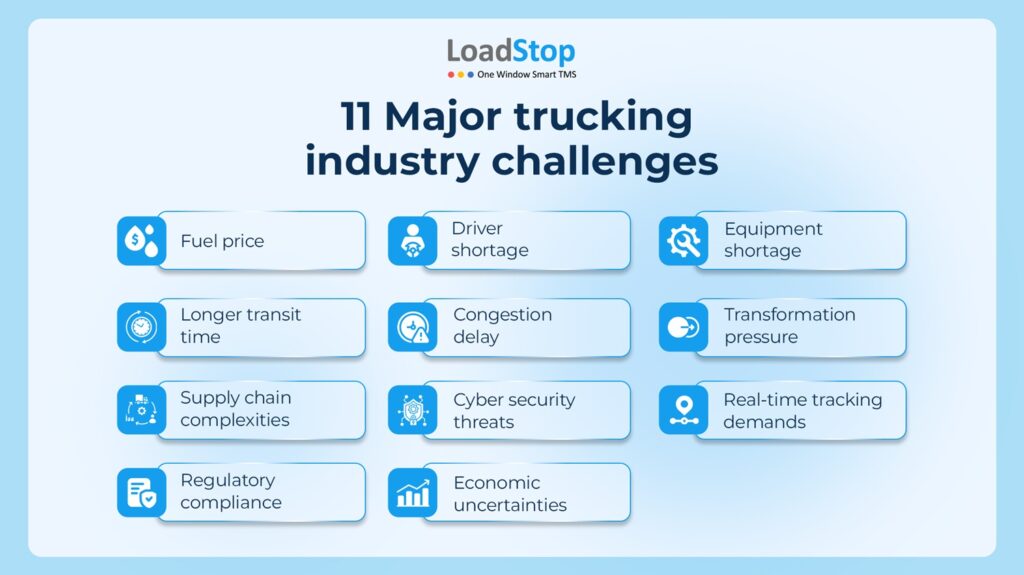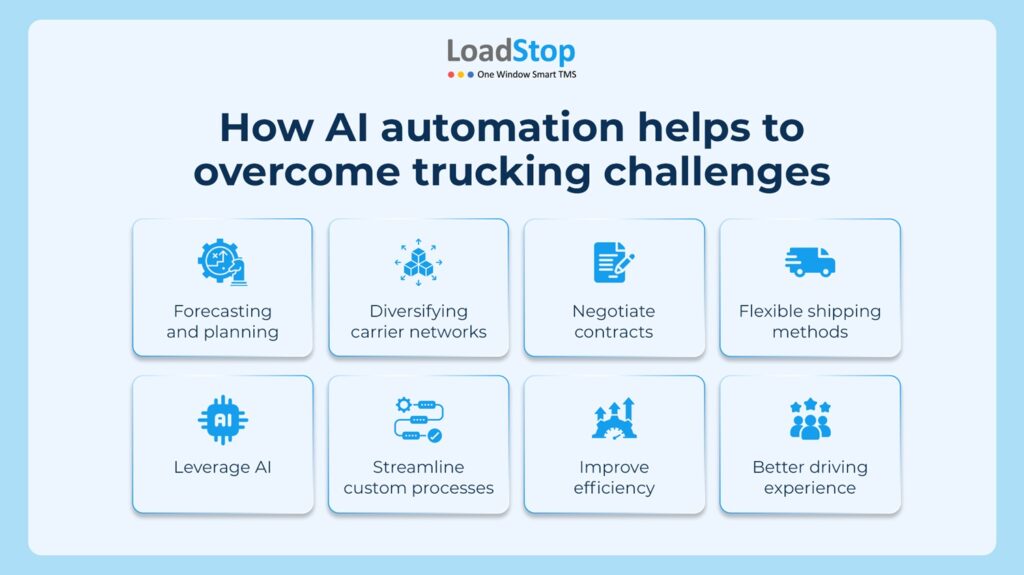The leaves’ colors are changing and the holiday season is approaching, so trucking companies must brace for the busiest time of the year. Demand for freight transportation skyrockets and so does the pressure on the carriers to manage the loads. This results in increasing truckloads and capacity crunches becoming more challenging due to driver shortage and availability of trucks. Although the peak season for trucking brings in more opportunities it also brings it fair share of challenges.
With the right smart technology, you can handle the industry challenges during peak season. This blog will explore the peak and slow season for the trucking industry, the challenges, and the best strategies to navigate the seasonal surges.
Peak seasons for the trucking industry
The trucking industry is slow to change but the market shifts are constant due to several external factors affecting truck demand. One of the major factors is the seasonal change.

July to September
Each season signifies the changes in utilization of trucks, drivers, and capacity however the start of the peak season is from July to September – also known as The Peak Season.
Trucking companies get a surge in orders because of high product demands. Fleet owners deploy more trucks, so the driver’s schedule is jam-packed to accommodate the growing demand.
October to December
This is the busiest season for the trucking companies. The transport activities are at the height while orders are being rushed to be fulfilled at the minute. Carriers usually look for high-paying loads during the holiday seasons.
Truck drivers are mostly spending time en route for a fast turnaround. It can be most taxing for truck drivers as the schedules are closely booked and at this time risk of road accidents is comparatively higher.
Slow seasons for the trucking industry
As the new year begins, it is the time when truck drivers can spend time with their families. This is the ultimate slow season in the trucking industry i.e. January to March. The holiday season has just ended and carriers are looking for new opportunities.
This is the extended break that truck drivers can enjoy and spend time recharging but it also means lower paychecks.
11 Major challenges trucking companies face during peak season
During the peak seasons, there are several challenges that trucking companies. It is important to understand them to better streamline the trucking operations. The major challenges that the trucking industry faces are:

1. Fuel price volatility
The fluctuating fuel prices are a constant headache for trucking companies. If the fuel prices increase, it creates a conflict with the profit margins, therefore increasing the operational costs. To combat this challenge, many trucking companies are moving towards SaaS-based trucking management platforms to help them optimize fuel usage to reduce traveling costs.
2. Driver shortages
Driver schedules are usually tight during the peak season. It also means they are constantly on the road and further away from their home frequently. Finding trained drivers during the holiday season is a hassle for trucking companies. Any delay in the shipment can cost the revenue.
Due to long strenuous hours of driving, driver burnout becomes common, making them leave their jobs which further creates driver shortages during peak season. This puts more strain on the available truck drivers and the vicious cycle keeps going on
3. Ongoing equipment shortage
To avoid any delays during the peak season, trucking companies often do maintenance tasks for the trucks. Shortage of essential equipment for trucks is a common trucking industry challenge due to the seasonal surge. The high demand during the season puts pressure on the truck fleets which can have a significant impact on freight transportation timelines and costs. To resolve this, many companies are focusing on fleet optimization using the TMS for regular fleet maintenance during the peak season.
4. Longer transit time
As the holiday season kicks into gear, the effects of severe weather conditions disrupt transit times. Due to rapid weather changes, ports are forced to perform increased maintenance every year, leading to longer transit times.
The extreme weather conditions cause an already overburdened and outdated transportation infrastructure to deteriorate earlier than initially expected. All these factors contribute to longer transit times during severe congestion.
5. Congestion delays
Ongoing congestion at every port of entry, forcing companies to look for alternatives to international sourcing of goods.
Increased logistics costs, growing customer demand, and congestion delays make it increasingly challenging for trucking companies to perform and deliver goods efficiently during the holiday season.
6. Transformation pressure
The trucking industry has been facing intense pressure to transform operations because of technological advancements and rising customer expectations. The need for real-time data and predictive analytics is more urgent than ever too. Although AI-driven trucking solutions help with load tracking, automating invoicing, and more, untimely changes within the trucking operations (during peak season) can make small trucking companies struggle with the sudden change.
7. Supply chain complexities
The global supply chain presents its share of challenges in the trucking industry. Instead, disruptions have far-reaching consequences due to capacity crunches, seasonal surges, labor shortages, and fluctuating fuel prices. It leads to a higher shipping cost and delayed deliveries.
8. Cyber security issues
The risk of cyber threats is always present despite the evolving technological tools. Trucking companies rely on manual methods of storing the load data and other important information, and protecting such data can become critical. To protect sensitive data TMS offers a great level of security with compliance and regulations. However, trucking companies need to implement the right cyber security practices to avoid any issues.
9. Real-time tracking demands
During peak season, customers are more on edge to receive their orders. Therefore the constant need to update them about the shipment can become difficult to cater. Trucking companies sometimes can lose track of the trucks because of several factors like tight schedules, no live update, lack of alerts, and so on. For this purpose, EDI functionality can be a lot helpful in helping customers keep track of their shipments.
10. Regulatory compliance
It remains a looming challenge for trucking companies. Regulations around emissions, working hours, and safety standards change making it difficult to be constantly vigilant about it. Trucking companies using the TMS platform can automate their records and stay compliant by updating their regulatory information on time.
11. Economic uncertainties
According to industry data, in 2023, $987 billion was the total freight bill. In 2024, trucking industry challenges have been more persistent than ever due to fluctuating diesel prices, driver shortages, capacity turnover, and other reasons. The market shifts make the trucking companies vulnerable to the recession that impacts the freight demand and pricing as well.
AI TMS Automation helps to overcome trucking challenges
July to December is the peak season for trucking companies, and it’s important to meet the demands of the customers. Whether it’s back-to-school supplies or end-of-year inventory stocks, the surge in demands can quickly become overwhelming. However, there are ways to overcome trucking industry challenges:

Early forecasting and planning
Trucking companies are aware of the peak and slow seasons. Based on their historical data, they can leverage the information and forecast market trends. Using an AI TMS platform allows you to plan the freight with predictive analysis to avoid potential disruptions and meet demand surges. You can place the orders in advance and book the loads early to avoid any last-minute capacity crunches at more favorable rates.
Diversifying carrier networks
Is it smart to rely on a single carrier? Probably not. Trucking companies should diversify their carrier networks to avoid any delays in deliveries during peak season. When you work with multiple carrier providers like trucking, air, sea, and rail, you have more options to move the loads. Also, brokers can help companies to tap into more capacity options.
Negotiate contracts
The volatile market trends impact the trucking industry and make it challenging to secure reasonable rates and capacity. Therefore, trucking companies must negotiate long-term contracts before the peak season hits. Primary retailers like Walmart, plan their load capacity and rates to avoid sudden increases in rates. It also ensures them guaranteed capacity on the fleet.
This proactive approach also helps them to reduce operational costs and prevent any disruptions during the busiest times of the year. Similarly, with AI-backed insights, you can secure better deals and secure a long-term relationship between the carriers and brokers.
Flexible shipping methods
Flexible shipping modes such as LTL FTL, and intermodal allow trucking companies to be adaptable to meet customer needs. For instance, in 2021, companies like Nike shifted to air freight to avoid delays caused by ship freights. Using intermodal shipping is useful to balance the costs and fulfill the urgency of shipment, streamline operations, and also reduce costs.
Leverage AI technology for visibility
Real-time tracking is the best way to leverage AI technology. Trucking companies can track the fleets with real-time GPS, traffic updates, and geofencing features. Utilizing SaaS-based TMS software for carriers and brokers enables companies to have accurate ETAs, better monitor shipments, and address any delays or disruptions for a smoother experience.
Streamline custom processes
Post-Brexit customs changes, trucking companies have now to work more closely with brokers. This also means streamlining the paperwork properly to ensure compliance and regulations to expedite the clearance processes. Trucking companies operating in the U.S. can navigate custom processes with the help of compliance and safety to manage operations and fleet security. Companies can also reduce the chances of accidents and minimize any penalties and fines.
Improving efficiency
Adopting AI-powered and cloud-based TMS technologies can help trucking companies automate business operations while improving business efficiency and profitability, reducing late shipments and operational errors, and increasing fleet utilization and load volumes.
Advanced technologies create opportunities for trucking companies to perform business operations more effectively in an increasingly virtual world. That way, they can stay focused on providing better communication and visibility to all the supply chain stakeholders, which is critical to avoid delays.
Improving visibility
Telematics is equipped with communication technology that helps companies monitor their fleet of vehicles, equipment, and other assets. This enables fleet owners and fleet managers to track the location of the vehicles and drivers in real-time.
By tracking vehicles and drivers in real-time, fleet owners and fleet managers can make accurate predictions about arrival times based on factors such as traffic, speed, weather information, and other data.
Digitized tools are being used to track vehicles at entry and exit points; these tools help speed up the check-in and out process and increase the turnaround times.
Better driver experience
Drivers are the backbone of the trucking industry and empowering them with the right technology is critical to the trucking company’s success. Advanced cloud-based software such as LoadStop offers a driver app that helps improve communication and increase productivity.
Dispatchers can easily dispatch loads to the driver with a single click. Once loads are dispatched, all dispatch-related information is promptly communicated to the driver. It is helpful to reduce congestion delays and waiting time.
Dispatch the load successfully without any hassle
Peak season presents challenges for trucking companies every year. Delays in shipment and lack of proper communication are more common as well. Companies need to take a proactive approach to stay competitive, ensure timely deliveries, and secure their fleets. Modern AI solutions such as AI-powered TMS can help them to overcome these trucking industry challenges. They can easily streamline operations, optimize fuel usage, better insight with load tracking for high flexibility and visibility. Want to see how AI-driven automation helps carriers and brokers handle seasonal surges?
See the big picture in real-time.
Book a DemoFAQs
Using the right technology such as geo-fencing, real-time tracking, and automated ETA can help trucking companies minimize load dispatching delays, optimize their routes for fast deliveries, and track their loads and drivers easily.
The transport management system (TMS) is a platform that helps trucking companies ensure their shipments are on track, they can streamline their operations and navigate the capacity challenges.
LoadStop is a SaaS-based TMS platform designed for carriers and brokers alike and is suitable to manage loads, schedules, routes, etc during the peak season easily. Its user interface is friendly and requires minimum training to become familiar with it. Some of the primary features that can help carriers and brokers include AI load tracking, AI load build, fleetops, automated invoicing, and so on.



